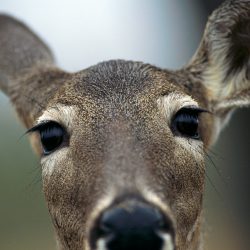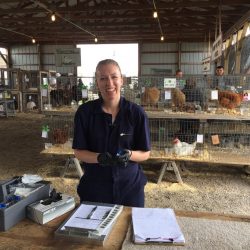Veterinary students are choosing careers in aquatic animal health
Aquaculture or fish farming is the fastest growing sector in the animal food industry. In the Great Lakes states, the potential for Michigan to reap economic benefit is enormous. But just like chickens, cows, and pigs, when fish are tightly packed in production facilities they become more susceptible to diseases. Veterinarians are much needed in aquaculture--to ensure the safety of our food, of the environment, and to be a part of a growing opportunity for Michigan to diversify its economy.

“Fish are a very important wildlife species that many people overlook,” says Leah Stein, DVM ’17, who worked with Dr. Mohamed Faisal (DVM, PhD, CertAqV) for her Aquatic Animal Medicine Clerkship (PDI 636). Now in its 15th year at MSU, Faisal, Professor PDI, his staff and doctoral students at the Aquatic Animal Health Lab train veterinary students to evaluate farmed and wild-caught fish, treat diseases, and study the mechanisms of immunity and the development of fish vaccines for use in fish production facilities of wild fish--especially where the potential for environmental contamination exists.

Veterinary students may hesitate when considering a clerkship with aquatic species. “The primary difference with aquatic medicine is that you are dealing with an animal in a very unique environment,” Stein says. “We consider environment as a factor for every animal's health, but aquatic environments have many more parameters to consider.” Stein has her sights set on a career involving wildlife disease investigation. “This rotation provided insight to the many diseases that can plague our fish populations, and how much the [MI]DNR (Department of Natural Resources) does to protect them."

After finishing her rotation in the Lab, Angie Burkett (DVM ‘17) says she has a much better understanding of aquatic animal medicine. “I think it's really cool that the basics do not change between species, and it was really great being able to apply the principles of medicine to a totally unique and new situation.” Burkett says she can see herself “working in an aquarium environment” as a career path. Burkett also participated in MARVET a Marine Veterinary Medicine workshop (http://www.marvet.org/) in Grand Cayman two summers ago, and says the what she learned during this rotation is complementary. “If I want to start working with fish, I feel confident that I have a good amount of background knowledge.”
For Christina Fenske, ’17, the Clerkship was a natural fit. “I have strong interests in herd health, food animal medicine, and conservation,” Fenske says. “Fish aren’t very snuggly, but working here combines all these aspects.” Fenske says fish health could definitely be part of her career plan.



